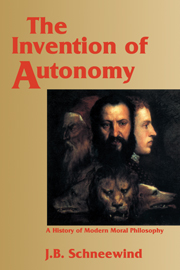Book contents
- Frontmatter
- Contents
- Preface
- Acknowledgments
- A note on references and abbreviations
- Introduction
- Part I The rise and fall of modern natural law
- Part II Perfectionism and rationality
- Part III Toward a world on its own
- 13 Morality without salvation
- 14 The recovery of virtue
- 15 The austerity of morals: Clarke and Mandeville
- 16 The limits of love: Hutcheson and Butler
- 17 Hume: Virtue naturalized
- 18 Against a fatherless world
- 19 The noble effects of self-love
- Part IV Autonomy and divine order
- Epilogue
- Bibliography
- Index of names
- Index of subjects
- Index of biblical citations
16 - The limits of love: Hutcheson and Butler
Published online by Cambridge University Press: 05 June 2012
- Frontmatter
- Contents
- Preface
- Acknowledgments
- A note on references and abbreviations
- Introduction
- Part I The rise and fall of modern natural law
- Part II Perfectionism and rationality
- Part III Toward a world on its own
- 13 Morality without salvation
- 14 The recovery of virtue
- 15 The austerity of morals: Clarke and Mandeville
- 16 The limits of love: Hutcheson and Butler
- 17 Hume: Virtue naturalized
- 18 Against a fatherless world
- 19 The noble effects of self-love
- Part IV Autonomy and divine order
- Epilogue
- Bibliography
- Index of names
- Index of subjects
- Index of biblical citations
Summary
Which comes first in morality, law or love? Moral philosophy after Grotius was deeply shaped by this issue. No one denied that both law and love have a place in morals, and even those who put law first could, with Pufendorf, allow that love, as the only source of merit, has a unique importance. The priority of law is often associated with a voluntarist view of God, and the priority of love with opposition to voluntarism. Law comes first for those whose main concern is with social order, while those who give the prize to love focus on individual character. The natural lawyers did not think they needed to say much about love once they had made theoretical room for it in imperfect duties. The theorists of love had to be a little more explicit about law. In particular they had to show how to understand concepts embedded in ordinary morality that seem tied to a law-centered approach – concepts of rights and duties and obligations. But Cumberland seemed as able as Pufendorf to give definitions from which to derive his system. How could one get a purchase on the disagreement? One might, of course, show that some particular theory contained internal problems; but to get beyond that, one would need to have a way of assessing the initial premises.
- Type
- Chapter
- Information
- The Invention of AutonomyA History of Modern Moral Philosophy, pp. 330 - 353Publisher: Cambridge University PressPrint publication year: 1997



